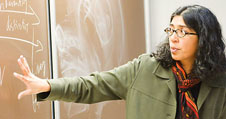Big help for small business

Two Northeastern School of Law professors have received a $500,000 grant from the U.S. Department of Commerce to develop a center to provide legal services to the region’s small businesses and study the resources needed for entrepreneurs below the poverty line to start their own companies.
“The goal is to evaluate and use data to prove or disprove our idea: that below the poverty line, the criteria for a small business to succeed or fail is quite difficult,” said Rashmi Dyal-Chand, a law professor and the project’s principal investigator.
Dyal-Chand will collaborate with professor James Rowan, the Law School’s director of clinical programs, who will be the senior advisor on the project, to be called the Community Business Law Clinic.
Starting this spring, law students and a team of lawyers under the supervision of Dyal-Chand and Rowan will work to help small businesses with legal transactions such as contracts, permits, leases and intellectual property issues. The law clinic will target new and emerging industries in and around Boston, including clean energy, green technologies, science and health technologies and small and ethnically diverse businesses. The clinic will also focus on businesses started by underserved entrepreneurs.
“The core purpose of our work is to support entrepreneurs in economically distressed areas who have the capacity to accomplish the commercialization of technology and to achieve high growth,” Dyal-Chand said.
The clinic, which has funding to run for the next four years and the potential to grow into a national program, will also help Dyal-Chand study what it takes for poor entrepreneurs to succeed, a topic she has researched since arriving at Northeastern nearly a decade ago. The new clinic aligns with Northeastern’s goal of fostering business innovation and entrepreneurship on campus and in the community.
“We don’t have a lot of data about what entrepreneurs need in order to succeed if they don’t have a master’s-level education, parents or family who could invest in their businesses, and networks that allow them to put together resources to get going,” Dyal-Chand said. “When they don’t have these resources, what does it take? We really have a blank slate of what we know right now.”
Dyal-Chand and Rowan aim to create the first clinic at Northeastern dedicated to transactional legal skills, a cornerstone of business law.
“The goal is to be providing both an education to our students and a meaningful service to the community,” Dyal-Chand said.





